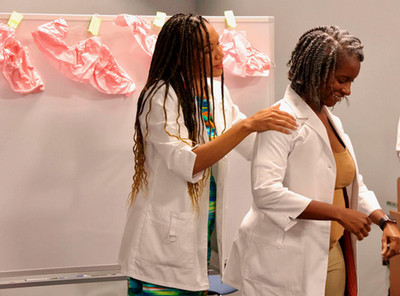
N.C. A&T TRiO Programs Celebrate 40 Years of Expanding College Access
02/24/2026 in Academic Affairs, Faculty, Staff, Students
08/07/2024 College of Agriculture and Environmental Sciences, Family and Consumer Sciences
EAST GREENSBORO, N.C. (Aug. 7, 2024) — North Carolina Agricultural and Technical State University this week will host the nation’s first lactation conference held at a historically Black college and university.
 The Uplifting Black and Brown Lactation Success Conference will take place Thursday, Aug. 8, and Friday, Aug. 9 at the N.C. A&T University Farm Pavilion. An estimated 180 lactation professionals, maternal health practitioners and others involved in the breastfeeding and birthworks communities across North Carolina and the United States are expected to attend.
The Uplifting Black and Brown Lactation Success Conference will take place Thursday, Aug. 8, and Friday, Aug. 9 at the N.C. A&T University Farm Pavilion. An estimated 180 lactation professionals, maternal health practitioners and others involved in the breastfeeding and birthworks communities across North Carolina and the United States are expected to attend.
“We want to provide an opportunity to highlight and celebrate the work being done around breastfeeding locally and nationally and help people gain the tools to continue to be successful in supporting communities with their infant feeding goals,” said Cierra Murphy-Higgs, a conference planning committee member who will join A&T’s lactation program this fall as didactic coordinator. “The Uplifting Black and Brown Lactation Success Conference will give lactation professionals the chance to connect and network with one another and embrace one another, as many of them have never met but have been cheering each other on from afar.”
The event is co-hosted by N.C. A&T’s Pathway 2 Human Lactation Training Program and Reaching Our Sisters Everywhere (ROSE), a national nonprofit organization dedicated to normalizing breastfeeding in Black communities. Both Murphy-Higgs and another conference organizer, Emma Makin Burress, who is now clinical coordinator for A&T’s lactation program, are graduates of the program’s first class in 2021.
The conference is intended to address challenges around breastfeeding support in communities of color and barriers to entering the lactation workforce. Though breastfeeding remains the best source of nutrition for most infants, racial and ethnic disparities persist in breastfeeding despite its growing prevalence in recent years. Black women in particular breastfeed their newborns at lower rates than women in other demographic groups due to long-standing cultural, hospital and historical practices.
In addition, Black, Hispanic, Asian and Native American individuals are underrepresented in the lactation consulting ranks because they have historically encountered more barriers to entering the profession. The lack of Black and brown lactation consultants has often meant that mothers in underrepresented communities have had difficulty receiving breastfeeding support.
The conference will feature two days of panel discussions and plenary presentations from local, state and national lactation professionals. Featured speakers include Jennifer Day, executive director of the U.S. Breastfeeding Committee; Brooke Gilliam, chair of the International Board of Lactation Consultant Examiners that credentials lactation consultants; and Clifton Kenan Jr., director at large of the Human Milk Banking Association of North America.
Janiya Mitnaul Williams, director of A&T’s Pathway 2 Human Lactation Training Program, will open the conference.
The conference will be preceded Wednesday, Aug. 7, by a reception and a white coat ceremony for the class of nine students entering A&T’s lactation program this fall. This postgraduate certificate program is offered through the Department of Family and Consumer Sciences within the College of Agriculture and Environmental Sciences and is intended to prepare culturally competent lactation professionals.
“Doing health care work at the grassroots level can be exhausting,” said Burress. “We want people to leave the conference with a sense of community, knowing that they are not alone — that there are people all over the country working to increase breastfeeding rates in families of color and improving access to care for those populations.”
Media Contact Information: llbernhardt@ncat.edu